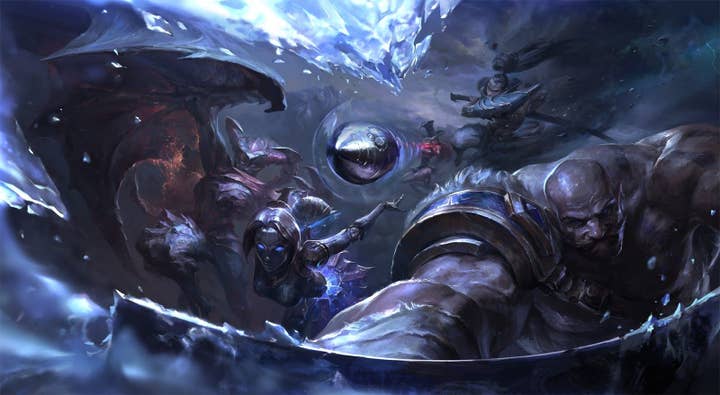Why the traditional product lifecycle “maybe doesn't apply” to League of Legends
After ten years, League of Legends is still one of the most popular games on earth and Riot Games is riding that wave into new spaces
When League of Legends first released over ten years ago, it had just 40 playable characters. But now, in 2020, the original cast have all been reworked and the total number has climbed to 148.
In fact, League of Legends today is an almost unrecognisable game to what it was ten years ago. It's core remains the same, but the level of depth, strategy and variety is arguably unmatched.
Until around two or three years ago, developer Riot Games assumed League would follow the same bell curve as every other live service game; slowly climb, peak, and settle into its long tail with a devoted audience of a couple of million, or even a few hundred thousand.

But as head of creative development and former League of Legends lead designer Greg Street tells GamesIndustry.biz at the Fun and Serious Game Festival in Bilbao, Spain, the "traditional product life cycle maybe doesn't apply."
"That's been my experience with games like World of Warcraft, where they may not be as popular as they were back in the day, but there is still a very devoted playerbase, and that's honestly what we were thinking with League of Legends for the last year or two," says Street.
"What we've actually seen an uptick in interest and PC café hours increasing in Korea and honestly we weren't expecting that. It was a really nice surprise."
As one of the most popular games around, despite the rise of Fortnite, League of Legends has facilitated a great deal of experimentation at Riot Games. In recent months, Riot has announced a new publishing label, a tabletop division, and six new titles including a fighting game spinoff, an original IP shooter, and even a card game.
Built on the back of League of Legends' success, Riot has been quietly plugging away at these projects for years. The raft of announcements only came in late 2019 as the ten-year anniversary of League of Legends loomed; Riot wanted to show fans it was committed being "more than a one-hit studio," and that League of Legends "isn't going to slowly fade away." So the decision was to just announce everything, even the wild ideas and projects still in early development.
"What happens is at any studio you make a game, and if it's successful you start to think about what to do next. Are we going to be a single-game studio or multi-game studio? Almost everyone concludes they should be a multi-game studio. So we tried to decide what to do next, and how to follow it up. We experimented with a variety of genres, typically where someone at the company was passionate enough about an idea.
"The challenge was actually in this world a lot of games end up shipping because the studio runs out of money, or because the publisher says you have you ship to hit a target, and we were in an unusual situation where we had a very successful game and did not have a tonne of pressure to get the second one out. So what happened is it went on for years, and years, and years -- some of these games have been in development for way too long."
"You can always get better and we believe that the process of learning something and seeing yourself improve is just satisfying on a very human level"
Among the list of in-development games are challengers to well-established esports titles like Overwatch and Street Fighter. Of course, esports in an area which Riot has excelled in recent years, and the League of Legends World Championship -- along with the North American and European leagues -- is unparalleled in terms of scope and popularity.
But these are still crowded spaces dominated by big players like Blizzard, Valve, and Capcom. Not to mention the diehard fan communities which have sprung up around the games and won't be easily tempted away by the next shiny bauble. The real question is, what learnings can Riot bring with it from League of Legends into these new spaces?
Streets says Riot is approaching this "from a position of humility" and doesn't believe success is inevitable. But one key strength of League of Legends is that "it's difficult to learn, and impossible to master."
"There is always something new to learn, you can always get better and we believe that the process of learning something and seeing yourself improve is just satisfying on a very human level," he adds.
This is largely the result of Riot's regular update schedule, which often reworks old champions, nerfs broken strategies, and encourages new approaches to play.
"On average we patch every two weeks to fix balance issues or strategies that are solved," says Street. "In fact, that was the genesis of the game and the studio; the original Riot developers were really frustrated with the game they were playing at the time... To them the community had solved the game, and everyone knew the right way to play and everyone knew which strategies were not going to be effective.
"Fundamentally [the updates] can go on ad infinitum, but I do think for individual players there is often a tipping point"
"So with our shooter game and our card game, we're going to make that same commitment of regular updates, rather than a game that sits on the shelf and maybe gets a little stale over time. We are going to fix what's broken, embellish strategies that are falling behind, add new champions and characters, and do the same things we've done for League. Will that be successful? We hope so, but like any studio we will probably have some hits and some misses, and we're fine with that."
Between 2015 and 2017, Riot effectively reworked every role in the game, but for some players, this constant raft of updates can be overwhelming. There is, Street says, a balance to be struck between keeping the game fresh and not drowning players in the unfathomable depths of new content. For a game that has not only survived ten years, but thrived, maintaining this balance is vital to its continued success.
"I think fundamentally [the updates] can go on ad infinitum, but I do think for individual players there is often a tipping point," he adds. "We try to be very sensitive to when we are adding too much or changing things too quickly, because if you have very engaged players, they are ready for anything.... Whereas someone who may only play once a week or once a month, they're gonna log in and feel like too much has changed."
Ultimately though, he adds, League of Legends "should always feel like home." Some things are so fundamental to the game, that even players returning after years away can understand and leverage their historic knowledge, but still feel like it's a game that is fresh, and worth revisiting.
"We have slowed down our cadence," Street continues. "Back in 2012 we would literally introduce a new champion every two weeks. Nowadays we add them much more slowly. Four or five champions a year, of which half are probably updates of older champions. Even though we think we need to add new content to keep things fresh, we try to do it at a reasonable rate that doesn't totally overwhelm people."
In 2018, it looked like Fortnite would reign for eternity, and there is little doubt it will continue being successful for some years yet. But what's quite telling is its recent and steady decline. Whereas Riot is no stranger to radical overhaul, Epic appears slightly more wary when it comes to tweaking the formula. The rise of Fortnite left Riot feeling hopeful, rather than confident, Street says, as League of Legends appeared to be losing ground to the battle royale. But as Street notes, these games "get a lot of attention for a time, but when players are finishing up with those games, they come back to League of Legends."
Disclosure: GamesIndustry.biz is a media partner for the Fun and Serious Game Festival.

